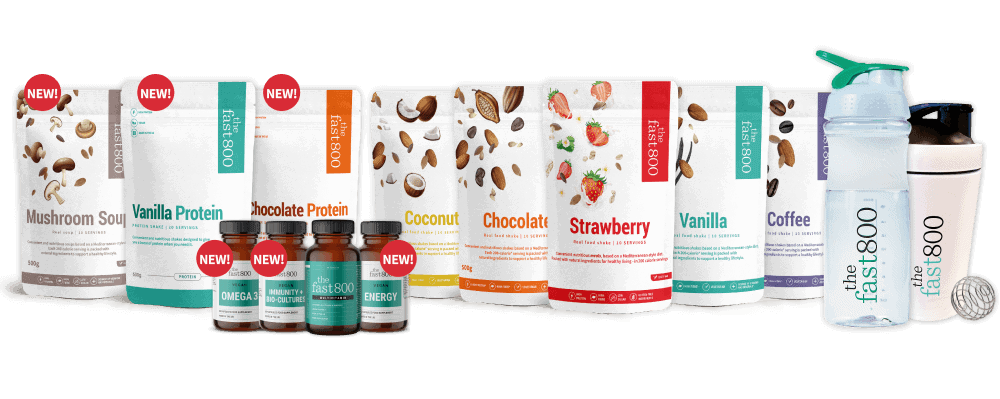Cooking Oil: Which Should You Be Using?
When it comes to fats and oils, we are spoiled for choice. Supermarket shelves are heaving with every conceivable option, from basic cooking oil to luxury options. In recent years, it’s been recognised that, when heated, cooking oils can break down and produce chemicals that are bad for us. Which, then, are the safest to use when cooking?
Firstly, it’s important to address the role that fats play in our health; fats are essential for the absorption of fat-soluble vitamins, to help stabilise blood sugar levels and for cell function. It’s clear that low-fat diets have been outdated as a result of scientific research and it is now recognised that incorporating quality fats, such as olive oil, oily fish, nuts and avocado, into your diet is crucial for good health. Healthy fats play a key role in a Mediterranean-style diet, one of the core pillars of The Fast 800.
Smoke point
When you are cooking at a high temperature – “smoke point” – the molecular structures of the fats and oils you are using change significantly. They undergo oxidation; they react with oxygen in the air to form substances like aldehydes and lipid peroxides.1 At room temperature something similar happens, though more slowly, and when fats go rancid, they have been oxidised. Consuming and inhaling aldehydes, even in small amounts, may link to a risk of heart disease and cancer.2 So, although you may think the bottle of oil that’s been sitting in the back of your cupboard will last a lifetime, you may want to pay closer inspection to the best before date.
Research from De Montfort University
A few years back, Dr Michael Mosley enlisted the help of Professor Grootveld, and his team from De Montfort University, to look further into this. The team ran an experiment where they took several oils, used commonly in cooking, heated them to frying temperature and analysed their chemical properties. The oils included sunflower oil, vegetable oil, corn oil, cold pressed rapeseed oil, olive oil (refined and extra virgin), butter and goose fat.
They found that oils rich in polyunsaturates, such as sunflower oil and corn oil, were breaking down into a range of potentially damaging chemicals (aldehydes and lipid peroxides) when heated. Whereas, the oils rich in monounsaturates, like olive oil, produce far fewer.

“Oils high in polyunsaturates are fine, as long as you don’t subject them to heat, such as frying or cooking. It’s a simple chemical fact that a molecule which is thought to be healthy for us converts into a serious of unhealthy molecules at frying temperatures. They then break down into very toxic compounds.” – Professor Grootveld
In his research, the olive oil and cold-pressed rapeseed oil came out fine when heated, as did the butter and goose fat. These fats are richer in monounsaturated and saturated fats, so they’re much more stable when heated.

Professor Grootveld recommended olive oil for frying or cooking, “firstly because lower levels of these toxic compounds are generated and secondly, the compounds that are generated are actually less threatening to the human body.”
So, what is the overall advice on cooking oil?
- Try to do less frying, particularly at high temperature. If you are frying, minimise the amount of oil you use.
- To reduce aldehyde production go for an oil or fat high in mono or saturated fat (preferably greater than 60%) and low in polyunsaturates (less than 20%).
- The ideal ‘compromise’ oil for cooking purposes is olive oil, because it is about 76% monunsaturates, 14% saturates and 10% polyunsaturates.
- For cooking, we recommend extra virgin olive oil and also coconut oil, avocado oil, butter, ghee, lard, duck fat. For dressings, we recommend extra virgin olive oil and also avocado oil, macadamia nut oil, sesame oil, walnut oil, flaxseed oil.
The final bit of advice is always keep your oils in a cupboard, out of the light, and try not to reuse and reheat oils, as that leads to the accumulation of more nasty side products.
A spotlight on olive oil
By Gabrielle Newman, The Fast 800 Recipe Developer and Nutritionist
Far from being a cause of weight gain as was once thought, “good” fats – rich in mono-and polyunsaturates like those found in extra virgin olive oil – powerfully curb the appetite, slowing the rate at which the stomach empties and delaying the point at which it signals for more food.
Extra virgin olive oil contains anti-inflammatory compounds, such as oleic acid, omega-3 fatty acids and polyphenols. Eating foods known to reduce inflammation can have positive effects on depression and gut health. When consumed as part of a Mediterranean-style diet, rich in fresh vegetables, extra-virgin olive oil and fish, studies suggest that it may well be possible to develop increased volume in parts of the brain linked to self-control – helping to reduce cravings and assist in weight management behaviour.
Rich in “good for you” monounsaturated fats and containing a wide variety of antioxidants, studies have shown consuming extra virgin olive oil reduces risk of developing cardiovascular disease, lowers blood pressure, lowers levels of bad cholesterol (all symptoms of metabolic syndrome) and protects against various forms of cancer. Despite common misconceptions, a 2006 study showed that there was no direct correlation between olive oil and weight gain.3
The Fast 800 online programme encourages the consumption of extra virgin and uses it regularly across our 400+ recipes available to members. Our recipes, and meal plans, keep you fuller for longer with healthy fats, protein and fibre. From our experience, this is a great balance for achieving, and maintaining, a healthy weight and lifestyle.
Guillaume C., et al. “Evaluation of Chemical and Physical Changes in Different Commercial Oils during Heating”. Acta Scientific Nutritional Health 2.6 (2018): 02-11
Esterbauer H. Cytotoxicity and genotoxicity of lipid-oxidation products. Am J Clin Nutr. 1993 May;57(5 Suppl):779S-785S; discussion 785S-786S. doi: 10.1093/ajcn/57.5.779S. PMID: 8475896.
Bes-Rastrollo M, Sánchez-Villegas A, de la Fuente C, de Irala J, Martinez JA, Martínez-González MA. Olive oil consumption and weight change: the SUN prospective cohort study. Lipids. 2006;41(3):249-256. doi:10.1007/s11745-006-5094-6









